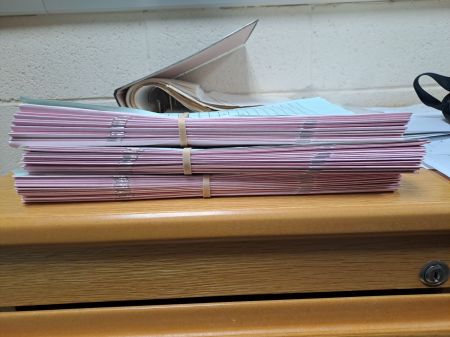Examinations are formidable even to the best prepared, for the greatest fool may ask more than the wisest man can answer.
-- Charles Caleb Colton
#Examinations
After Lectures and before Examinations
This morning I did my last teaching session of the Academic Year 2024-5, a revision lecture/tutorial on Computational Physics. It was optional, as this is officially a study break, and was at 9am, but I had about 30% attendance which wasn’t bad in the circumstances. As is often the case with optional sessions, I think the students who came were the keenest and probably therefore those who least needed last-minute tips for the examination, but that’s always the way.
The Examination Period starts tomorrow morning, but most of the students who turned up this morning have their first examination on Monday 19th May which happens to be Computational Physics.
Anyway, now that my teaching is over I thought I’d take the opportunity to wish all students the best for their examinations:
You shouldn’t really be relying on luck of course, so here are some tips (especially for physics students, but applicable elsewhere).
- Try to get a good night’s sleep before the examination and arrive in plenty of time before the start. Spending all night cramming is unlikely to help you do well.
- Prepare well in advance so you’re relaxed when the time comes.
- Read the entire paper before starting to answer any questions. In particular, make sure you are aware of any supplementary information, formulae, etc, given in the rubric or at the end.
- Start off by tackling the question you are most confident about answering, even if it’s not Question 1. This will help settle any nerves. You’re under no obligation to answer the questions in the order they are asked.
- Don’t rush! Students often lose marks by making careless errors. In particular, check all your working out, including numerical results obtained your calculator, at least twice
- Please remember the units!
- Don’t panic! You’re not expected to answer everything perfectly. A first-class mark is anything over 70%, so don’t worry if there are bits you can’t do. If you get stuck on a part of a question, don’t waste too much time on it (especially if it’s just a few marks). Just leave it and move on. You can always come back to it later.
Maynooth University Library Cat Update
I was on a mission to the South Campus just now and found Maynooth University Library Cat behind bars. He’s actually just resting in the semi-shade behind the gate to conserve energy before the exams start on Friday morning, at which time he will need to make himself available for last-minute consultations and therapeutic petting.
Marking Time
So here we are, then, with only a few days before examinations start (next Friday, 16th May). The examinations for my two modules take place on Monday 19th and Tuesday 27th May, and after that I’ll be busy with marking for a while.
Marking doesn’t just mean written examinations. I have been teaching a module on Computational Physics to 3rd Year students here in Maynooth, and 40% of the assessment for that is a mini-project (usually done in groups of two or three). Early on the term, I put up a list of 16 projects and asked them to pick first second and third choices so I could form groups in such a way that most students get to work on a project they have actively chosen.
Anyway, the deadline for projects to be handed in passed last week so I’ve got a stack of those to mark which, you will realise, why I am indulging in a displacement activity by writing this blog post. My plan is to mark these during this week so that they’re done before the written examinations come in, which means by next Monday (19th). This year we have had a bigger class than usual, so this I have quite a lot of marking to do.
Last week also saw the deadline for the last assignment in Particle Physics to be handed in. I want to mark those as soon as possible, but I’m not sure I’ll have time this week, but I should be able to do them before the exam on the 27th.
Incidentally, one of the submissions of the last assignment came with a note that this was the last assignment the student had done in Maynooth and that the first one he had done, when he was in his first year, was also set by me.
Examinations in May
In the Irish language, the month of May is called Bealtaine after the old Celtic festival that marks the mid-point between the Spring Equinox and the Summer Solstice. May Day is Lá Bealtaine, one of the so-called Cross-Quarter Days that lie halfway between the equinoxes and solstices. The Bank Holiday associated with this day is not May 1st, as it is throughout Europe, but the first Monday of May, which this year means today. I’m therefore officially off work, though I have quite a few things to do so will be working from home for most of today.
This Bank Holiday offers a bit of a breather before the end of teaching term (Friday May 9th) and the start of the Examination period (Friday May 16th). There are just four more days of teaching, and I have just a couple more lectures to do. In a normal week I would have a Particle Physics tutorial this Monday afternoon, but instead I have offered to do one next Monday (12th) to go through the last assignment which is due in on Friday. The examination for Particle Physics is on 27th May, which is one of the last of the year; this is a final-year module so for many students it will be their last examination at Maynooth.
My Computational Physics students are working on their projects which are due in on Friday 9th; that gives me about a week to grade them before the examinations start. The Computational Physics written examination is on Monday May 19th and if all goes to plan I will have the projects marked before I embark on the examination scripts. Instead of formal teaching sessions, the computing lab, together with demonstrator assistance, is at the disposal of the students for their projects during this time. I anticipate plenty of last-minute acitivity in Thursday’s session!
Anyway, on Friday I have to give a Departmental Colloquium as well as my final Particle Physics lecture. Then, to mark the end of teaching, I’m going to the National Concert Hall to listen to some music. The next morning I’ll have to get up very early for the Darkness Into Light, which involves a 5km walk ending at sunrise.
After next week attention will turn to examinations. For me that’s not only in Maynooth. I haven’t mentiond it on here before but I have agreed to act as External Examiner for undergraduate Physics programmes at Imperial College, London, for the next few years. The meeting of the Examination Board there is not until July, which is long after ours in Maynooth so there will be no clash, but I have been doing some work (vetting papers, etc) alongside my own work. The examinations at Imperial take place roughly alongside ours, but there are so many more students there than at Maynooth that a longer time is needed for grading the scripts so the end of the process is much later.
In the past, I’ve been External Examiner in a number of UK universities. The last was Cambridge, in fact, where my term ended in 2017 while I was still working in Cardiff. I haven’t done any since moving to Ireland: being Head of Department, especially during lockdown, did not allow me the time. My term as External at Imperial will last until I retire, so this is the last such job I’ll be doing.
There’s quite a lot of work involved with being an External Examiner, but I always find it interesting to see how other institutions run their programmes. As well as providing feedback and, if necessary, advice to the Institution I always pick up interesting ideas from them too. Imperial’s Physics programmes are much broader than ours, so there’s a huge difference in scale, but I’m sure there will be things to learn. I mean in general terms, of course. All the details are confidential, for obvious reasons.
#Examinations #ExternalExaminer #ImperialCollege #MaynoothUniversity
Examinations are formidable even to the best prepared, for the greatest fool may ask more than the wisest man can answer.
-- Charles Caleb Colton
The subjects that were dearest to the examiners were almost invariably those I fancied least... I should have liked to be asked to say what I knew. They always tried to ask what I did not know. When I would have willingly displayed my knowledge, they sought to expose my ignorance. This sort of treatment had only one result: I did not to well in examinations.
-- Winston Churchill
⬆ #Wisdom #Quotes #WinstonChurchill #Education #Examinations
🔴 **The exam paradox**
The Oxford Scientist
_"The grass is not greener on any side, because no amount of A/A* grades can replace the raw, unfiltered experiences of growing up; we only have one childhood and often we must make sacrifices for our future self. The current job market is saturated with graduates—a degree on its own is no longer as valuable as it used to be—and you need more than good grades to stand out."_
🔴 **Could you pass an English exam from 1913?**
Janine Machin
_"The exam comprised a series of papers on phonetics, grammar, and translation, which took 12 hours to complete."_
🔗 https://www.bbc.co.uk/news/articles/cedn9pqg9jlo.
#History #Education #Learning #Examinations #Exams #English #Language
Marking Progress
I’ve been at home marking examinations almost all day and have decided to knock off until tomorrow when hopefully I can finish the job. I say almost all day because I took a break this afternoon to back to campus to collect some papers that I didn’t get yesterday because they were from students sitting the examination for various reasons in alternative venues on campus rather than the main examination room.
What I do with examination scripts is mark one question at a time rather than one script at a time. What I mean by that is that I go through every script marking all the attempts at Question 1, then I start again and do all the Questions 2, etc. I find that this is much quicker and more efficient than marking all the questions in each script then moving onto the next script. The reason for this is that I can upload into my mind the model answer for Question 1 so that it stays there while I mark dozens of attempts at it so I don’t have to keep referring to the marking scheme. Other advantages are that it’s easier to be consistent in giving partial credit when you’re doing the same question over and over again, and that also you spot what the common mistakes are more easily.
It’s a fairly monotonous job and I find my concentration starts to wander if I try to do too many in one go. Fortunately the exam papers are organized in batches (separated by elastic bands as in the photograph) so I usuallly take a break – as a sort of self-reward- after each batch to break things up. Each batch usually takes a couple of hours or so, so the breaks often end up as times to have lunch and tea. In terms of the timing it’s rather like a game of cricket, actually.
Today I corrected Question 1 in two batches before lunch, then another between lunch and tea. At that point I took a walk into town to do a few errands and then collected the remaining scripts from campus, which I have now just finished correcting. Some people will accuse me of being lazy, taking breaks like this, but I think it’s more efficient to do it this way. Trying to mark examinations for hours on end inevitably leads to more errors, so in the long run it takes longer to complete the job. Slow and steady does it.
I remember using a similar approach when I wrote my thesis many years ago. That’s a much bigger job, of course, but I found what worked for me was to plan out each chapter in terms of sections of roughly equal length, write each in turn and take a break when I’d finished it. Writing a thesis of around 200 pages may seem a daunting task, but if you split it into 1000-word chunks spread over three months or so it’s quite manageable – and you can plan to take time out for relaxtion along the way to avoid getting too burned out by the process.
Anyway, I’ve now finished all the attempts at Question 1 in this examination, including those in the extra scripts I picked up today. Question 1 consists of a set of short problems and is altogether worth 50% of the examination mark, so I’m actually abouty halfway through the marking. There three questions left, each longer than the pieces of Question 1 and worth 25% of the overall mark. Students are supposed to answer two. I’ll start on Question 2 in the morning and hopefully by this time tomorrow evening I will have marked all three, and that will be that. Until the next one…
Marking Time Again
Lecturers at Maynooth University are supposed to be available on the telephone to deal with queries from students concerning their examinations. This morning I was “on call” for the first time in 2025 and indeed the first time since 2023. Since I live in Maynooth I decided to come into campus in case of a query so I could go to the examination hall to deal with it if required. In the event, however, the examination passed off without incident and nobody called.
I wasn’t twiddling my thumbs all morning though. It seemed a good opportunity to go through the accumulated coursework for this module applying various exemptions for medical or other reasons so that when I’ve marked the scripts I can immediately combine the results with the CA component.
So here I am again, with a stack of an examination scripts to mark. The picture shows about 50 papers, part of the collection from my module on Differential Equations and Transform Methods. I want to get them out of the way as quickly as possible as I have another paper coming up next week and have a lot of other things to do before term starts at the beginning of February. I plan to spend the next couple of days correcting these, adding up the marks, combining those with the coursework, and preparing everything for upload to the system. I want to get this task out of the way as quickly as possible as I have another paper coming up next week and have a lot of other things to do before term starts at the beginning of February.
Exam Time Again
The January examination period starts tomorrow (10th January), so I thought I’d do a quick post on the topic of examinations. First of all let me wish the very best of luck everyone at Maynooth or elsewhere taking examinations in the next few weeks. I hope at least that the exam halls are nice and warm!
As the first examination for which I have responsibility is not until Monday 13th – unlucky for some! – I’ll have to wait to find out how any of my students have done but let me take this opportunity to pass on a few quick tips.
- Try to get a good night’s sleep before the examination and arrive in plenty of time before the start. This is especially important when there’s bad weather that may disrupt travel. It is your responsibility to get to the examination on time!
- Read the entire paper before starting to answer any questions. In particular, make sure you are aware of any supplementary information, formulae, etc, given in the rubric or at the end.
- Start off by tackling the question you are most confident about answering, even if it’s not Question 1. This will help settle any nerves.
- Don’t rush! Students often lose marks by making careless errors. Check all your numerical results on your calculator at least twice and – PLEASE – remember to put the units!
- Don’t panic! You’re not expected to answer everything perfectly. A first-class mark is anything over 70%, so don’t worry if there are bits you can’t do. If you get stuck on a part of a question, don’t waste too much time on it (especially if it’s just a few marks). Just leave it and move on. You can always come back to it later.
Readers of this blog are welcome to add other tips through the comments box below!
#Examinations #HigherEducation #MaynoothUniversity #theoreticalPhysics
To counter cheating and the rise of the use of AI models, the University of South Australia are reintroducing oral exams - what do you think? https://unisa.edu.au/media-centre/Releases/2024/out-with-exams-in-with-verbal-assessments/ #AI #cheating #exams #examinations #assessment #academia #univeristy
Approaching Examinations
We’re in Week 9 of teaching in the Autumn Semester at Maynooth University, which means we’ve got one eye on the forthcoming Examination Period, which starts on 10th January 2025. Examination papers have already been prepared in draft form, and are now being checked ahead of printing. A draft examination timetable has also been released to staff, but not yet to students in case it has to be revised because of clashes.
I’m still on schedule with both my modules to finish the actual content in time to do use the last week for revision classes, going through past examination papers and generally helping the students prepare for the ordeals of January. There is a continuously-assessed component of both my modules, which counts 20% of the overall grade. One purpose of these assignments is to give the students some practice at the sort of problems they might encounter in the examinations: if they can do the assignments, they shouldn’t be too fazed by the examination questions. The purpose of the coursework is not just about passing examinations, however. I think the only way really to learn about mathematical physics is by doing it; the coursework is at least as important as the lectures and tutorials in terms of actually learning the subject. I think that modern higher education involves drastic over-assessment. Too much emphasis on grades and scores can be detrimental to real learning, but assessment that is formative can be extremely beneficial. Continuous assessment provides a way to give feedback to students on how they are doing, and to lecturers on how well the message is getting across; giving grades to such coursework is really just an incentive to the students to do it. It’s not primarily intended to be summative.
Anyway, back to examinations. One big difference between our examinations in Theoretical Physics in Maynooth and those at other institutions at which I’ve taught (in the UK) is that most of the papers here offer no choice of questions to be answered. Elsewhere it is quite common to find a choice of two or three questions from four or five on the paper. In my module on Differential Equations and Complex Analysis, for example, there are four questions on the examination paper and students have to do all of them for full marks.
One advantage of our system is that it makes it much harder for students to question-spot in the hope that they can get a good grade by only revising a fraction of the syllabus. If they’re well designed, a few longish questions can cover most of the syllabus for a module, which they have to in order to test all the learning outcomes. To accomplish this, questions can be split into parts that may be linked to each other to a greater or lesser extent in order to explore the connections between different ideas, but also sufficiently separate that a student who can’t do one part can still have a go at others. With such a paper, however, it is a dangerous strategy for a student to focus only on selected parts of the material in order to pass.
As an examiner, the Maynooth style of examination also has the advantage that you don’t have to worry too much if one question turns out to be harder than the others. That can matter if different students attempt different questions, as students might be penalized if they chose a particularly hard one, but not if everyone has to do everything.
But it’s not just the number of questions that’s important, it’s the duration. I’ve never felt that it was even remotely sensible for undergraduate physics examinations to be speed tests, which was often the case when I was a student. Why the need for time pressure? It’s better to be correct than to be fast, I think. I always try to set examination questions that could be done inside two hours by a student who knew the material, including plenty of time for checking so that even a student who made a mistake would have time to correct it and get the right answer. If a student does poorly in this style of examination it will be because they haven’t prepared well enough rather than because they weren’t fast enough.
#assessment #Examinations #FormativeAssessment #MaynoothUniversity #SummativeAssessment
Amid all the excitement last week I forgot that it was the sixth teaching week of the Semester. That means that we’re now past the halfway point. Among other things that meant that examination papers were due in on Friday (8th November). That means two papers for each module I’m teaching, one to be sat in January and another for the repeat opportunity in August, so that’s four altogether.
I always find setting examination questions very difficult. In theoretical physics we want to stretch the stronger candidates at the same time as allowing the weaker ones to show what they can do. It’s a perennial problem how to make the questions neither too easy nor too difficult, but it is compounded this time by the fact that I’m teaching two modules for the very first time so judging the right level is tricky.
Another issue is that I’m once again in a situation in which I have to set examination papers without having taught all the material. At least I’ve covered the first half of the content so I have some idea of what the students found difficult, but that’s not the case for the second half. It should be a bit easier next year once I’ve experience of covering the whole syllabus. Assuming, of course, that I’m teaching the same modules again next year, which is by no means guaranteed…
I’m teaching a module on Differential Equations and Complex Analysis for 4th year students and just about ready to switch to the part that comes after the and. I taught a bit of Complex Analysis when I was at Sussex and I’m quite looking forward to it, although it does pose a particular challenge. Some of the class are doing a Double Major in Theoretical Physics and Mathematics, and have done quite a lot of Complex Analysis before, while others are doing a Single Major in Theoretical Physics and haven’t really done any. I have to somehow find a way to satisfy these two different groups. The only way I can think of to do that is to teach the subject as a physicist rather than a pure mathematician, with an emphasis on examples and real-world applications rather than in the abstract. We’ll see how this works out over the next few weeks.
P.S. On the subject of Complex Analysis, I just remembered this post from a few years ago.
https://telescoper.blog/2024/11/11/midpoint/
#ComplexAnalysis #education #ExaminationQuestions #Examinations #mathematics
This Day in Alaska History-February 22nd, 1919
[the_ad id="30587"]
[the_ad id="37544"]
https://alaska-native-news.com/february-22nd-1919/47617/
#Alaska #crews #examinations #flu #history #influenza #lifted #passengers #quarantine #skagway
https://schoolscompared.com/guides/uk-government-explains-why-a-levels-must-be-abolished-in-favour-of-new-advanced-british-standard-baccalaureate-equality-of-opportunity-for-all-children/ The end of A-Levels … #baccalaureate #ib #education #exams #ukgovernment #alevel #children #examinations #teacher #teaching
Spent the day wading though the translation of written exams to digital format for #unimelb - some observations:
Commercial OCR is cactus
Handwriting is a dead art form
Scans are unreliable and vary hugely in colour
Anything that relies on a choice of answers should be done exclusively online
Entrance exam for an art school in China. 😱#art #examinations #china








